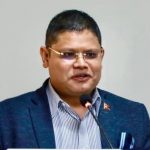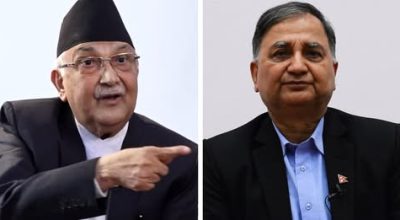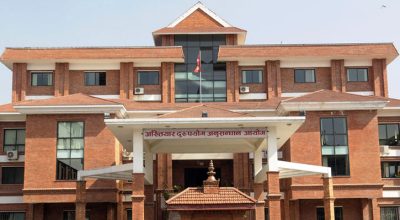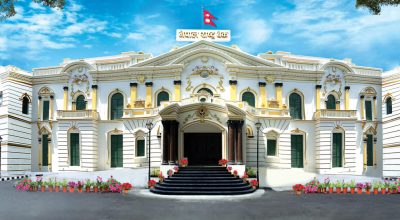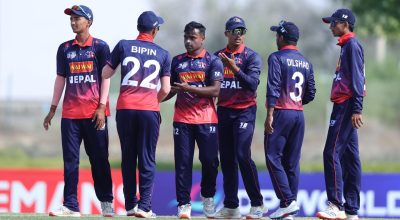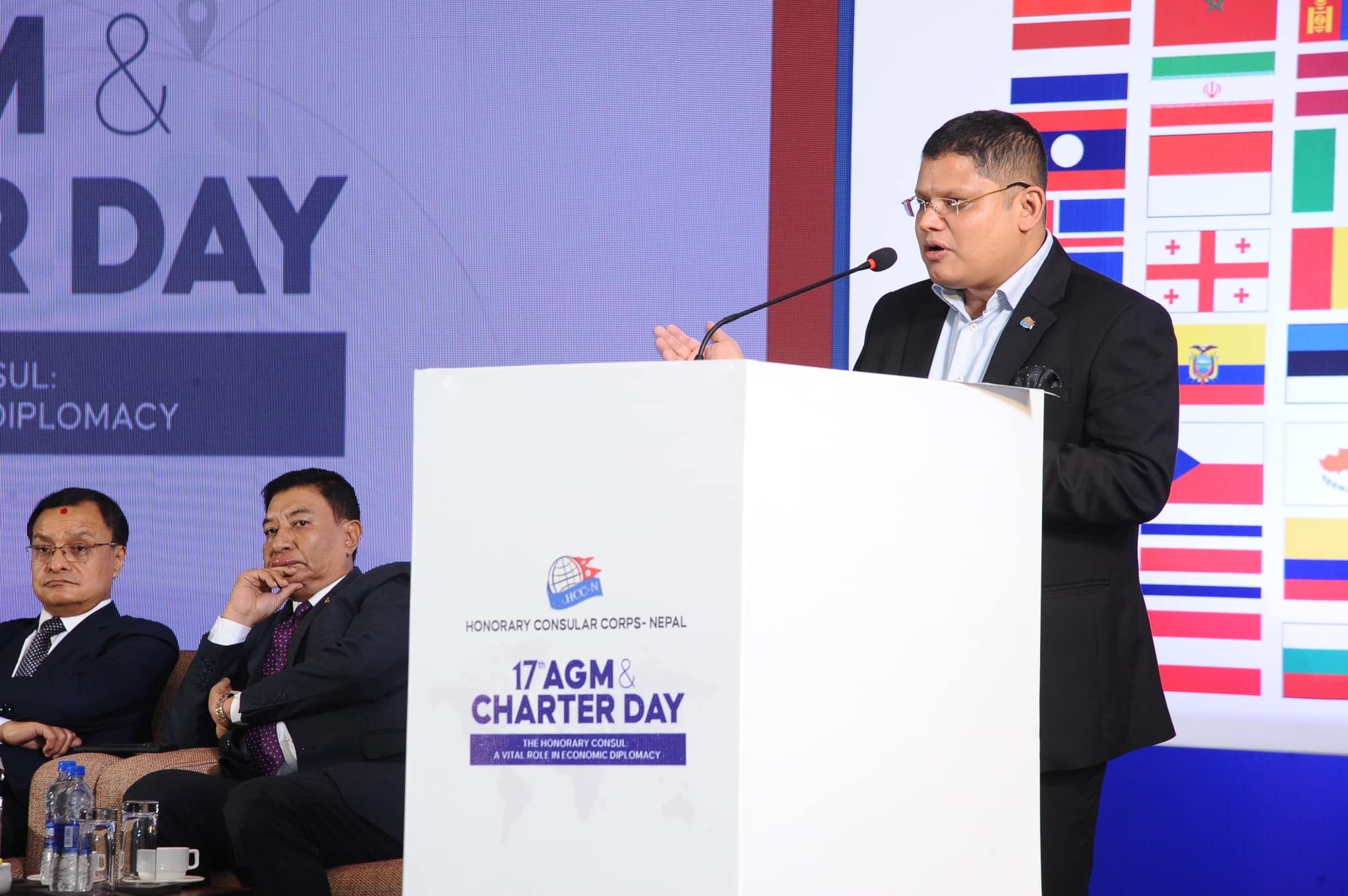
Manish Thapa
It is a distinct honor, both professionally and personally, to be here today as a keynnote speaker. I would like to focus on a topic of particular significance today: “The Honorary Consuls: A Vital Role in Economic Diplomacy”. Naturally, I will also be making references to the experience as a Honorary Consul of Costa Rica to Nepal.
Let me start defining the “Role of Consul”!!!
Consuls have been with us since antiquity, preceding by many centuries the establishment of diplomatic missions. The institution originated in classical Greece and extended to the period of 500 BC.
The need to have information or intelligence about the policies and public opinion of city-states was as vital in ancient Greece as it is for all of us today.
Given the non-existence of data banks or foreign ministries, knowledge was personalized and time limited. What the Greeks did on a grand scale and in lieu of establishing diplomatic ministries was appoint consuls or proxenoi, as they were called.
One of the interesting aspects of the definition of consul was his role in the Roman Empire. At that time the consul was a bridge or link between the governing and the governed.
This unique historical role of public service to a community of citizens is consistent throughout the development of consular history and is reflected in the modern role of the consul and the honorary consul.
The modern term consul is derived from the Latin “consulere,” meaning “to advise or to attend.”
It was no accident that the great novelist Graham Greene chose to name his work on political chaos and moral responsibility, “The Honorary Consul.” Just as Greene was driven by personal complexities and drawn to the political “wild and remote,” the honorary consul seeks to simplify the complex, often serving in various locations as outposts and sentinels of public diplomacy.
The honorary consul also serves as a vital link and liaison between the government’s embassy and its citizens living abroad. But the honorary consul is no mere civil servant; he or she is actually a “civilian servant.”
The honorary consul is called upon to help citizens with a number of problems, including legal assistance, immigration help and even medical aid, while always helping to promote trade and investment.
In this way, the honorary consul is the “first responder” in times of crisis, helping citizens in distress and, in some instances, aiding citizens in despair. In this role, the honorary consul is also the human face of the sending government, endowed with a human touch that is the most important element of diplomacy.
And this is more so in the case of the country I represent Costa Rica, which rely almost exclusively on the work performed internationally by their honorary consuls all over the world.
In fact this morning, 12 civil servants of Government of Nepal and 2 World Bank’s diplomat were in my office to get their Costaa rican visa stammped on their passport for an official tour to Costa Rica and their view was I am the face of Costa Rica in Nepal and my office is piece of Costa Rica in Nepal.
Thus, our sending countries rely heavily on the work of their honorary consuls. They depend on their role as their “sentinels.” It is indeed the true outposts of public diplomacy.
By the sheer weight of demography and the burden of geography, the consul is the key to building the bridges and bonds of friendship between nations and peoples.
The task of the consul is obviously daunting. It requires constant attention to developments ranging from issues of international trade and investment to the political and economic, and it includes the cultural and the social.
It is no easy task. The cultural element of the mission is also essential. Cultural awareness and appreciation is an essential prerequisite to promoting greater understanding between and among peoples. This is especially important in the face of mounting intolerance and insularity.
Now let me dive into the context of Economic Diplomacy and how Honorary Consul can be a bridge on econnomic diplomacy between the sending and the receiving countries.
As a Honorary Consul General or Honorary Consul, we all have the dual responsibilities, as we are appointed by our sending states to represent them in our country of origin at the same time we also have obligation of the receiving state to promote host countries in the sending states as well. Honorary Consul can extend the bilateral diplomatic representation of their country often limited due to the constrained resources, enhance both its brand and international relevance and play an important role in its international economic relations.
Indeed, honorary consuls can contribute decisively to the international image of their country far beyond the classical functions of visa issuance and citizen services as example!
These extended functions encompass efforts notably in the public, social, economic and cultural diplomacy domains and such opportunities will help to make the role of the Honorary Consul more visible locally and to position them as a respected and essential actor in the public life and business.
Honorary consuls are increasingly important part of economic diplomacy. Indeed they enhance the interests of their representing county’s economy, promote their potentials in the field of economic collaboration and foreign investments and have a fundamental role in opening the doors to the companies either in both sending and receiving states. They are very active in the cultural, political and humanitarian fields.
Take this room as an example, we have almost 50 plus Honorary Consuls who are renowned figure in the cultural, political and humanitarian fields. We have the Presidents of FNCCI, CNI, Hotel Associations of Nepal, Bilateral Chambers etc. We have famous hoteliers, top business house of Nepal, you name it as we have all of them represented by this group.
So how as Honorary Consul we can play a vital role in Economic Diplomacy.
In the realm of international relations, economic diplomacy plays a pivotal role in fostering trade, investment, and economic cooperation between nations.
While traditional diplomacy often revolves around political and strategic matters, economic diplomacy focuses on leveraging economic opportunities and maintaining strong commercial ties.
Within this context, the role of the honorary consul emerges as a crucial link between governments, businesses, and international trade.
An honorary consul is an individual appointed by a foreign country to represent its interests in a specific region or city.
Unlike career consuls, honorary consuls are typically citizens or residents of the host country and do not receive a salary. Instead, they maintain their primary professions or business activities while undertaking consular duties on a part-time basis.
Honorary consuls play a vital role in advancing economic diplomacy objectives. They act as facilitators, connectors, and promoters, working to strengthen economic ties between their host country and the appointing nation.
Their involvement encompasses a wide range of activities, including market research, trade promotion, investment facilitation, and resolution of trade-related issues. Honorary consuls often serve as valuable sources of market research and business intelligence. They possess local knowledge, cultural insights, and networks that can assist businesses seeking to enter new markets.
By providing information on market trends, consumer behavior, regulatory frameworks, and investment opportunities, honorary consuls enable companies to make informed decisions and minimize risks associated with international expansion.
One of the primary responsibilities of honorary consuls is to promote trade between their host country and the appointing nation. They actively engage in networking activities, organizing trade missions, business conferences, and matchmaking events.
Through their extensive local networks, honorary consuls connect businesses, entrepreneurs, and investors, fostering mutually beneficial partnerships and collaborations.
Honorary consuls serve as facilitators for foreign direct investment (FDI). They assist foreign companies in navigating the local investment landscape, providing guidance on legal and regulatory frameworks, investment incentives, and potential strategic partnerships. By actively promoting investment opportunities and highlighting the host country’s advantages, honorary consuls attract foreign capital, stimulating economic growth and job creation.
In cases where trade-related issues arise, honorary consuls can play a crucial role in facilitating dialogue and resolving disputes.
They act as mediators, leveraging their qusai-diplomatic status to communicate with relevant authorities, government agencies, and business associations.
By bridging gaps and fostering understanding between stakeholders, honorary consuls contribute to maintaining a favorable business environment and preventing potential trade conflicts.
In looking at the globalized world economy, diplomacy finds itself transforming in both direction and purpose to concentrate on the ‘low politics’ arena, where commerce, trade, tourism, and the local level, as opposed to the capital or national level of contact, are extremely important. More and more cases can be drawn where countries are unable to upkeep expenses of maintaining the full-fledged embassies and using Honorary Consuls to represent them.
Honorary consul and its use for trade, tourism, and investment promotion has been a trend in the modern diplomacy.
At first glance, it would appear to be a tool used principally by smaller countries like Nepal, ranging from microstates to mid-level powers to better leverage local and regional business development opportunities. But if we look into deeper this has been the case even with the powerful states.
For example, Russia, an erstwhile superpower, but still a large and major regional power, makes extensive use of honorary consuls as a dynamic tool for developing stronger relations between nations and in increasing commercial and economic ties.
In fact, in specific countries, like the United States, Great Britain and Japan, Canadian honorary consuls devote 100 per cent or nearly 100 per cent of their time on trade & investment matters.
Thus, honorary consuls are now seen as critical ingredient for success in adapting to the changes occurring in diplomacy, by enabling better trade, tourism, and investment promotion, in order to move their economies up the commercial value chain thus promoting economic diplomacy.
Mr Manish Thapa is the Consul General of Costa Rica to Nepal. He was addressing a ceremony of the Charter Day and 17th Annual General Meeting of the Honorary Consul Corps Nepal (HCCN) in Kathmandu.




